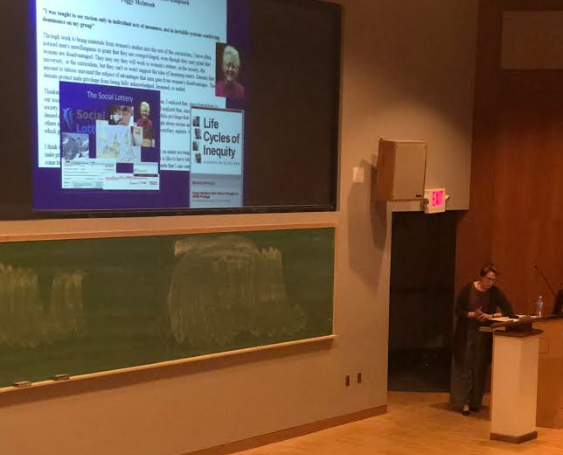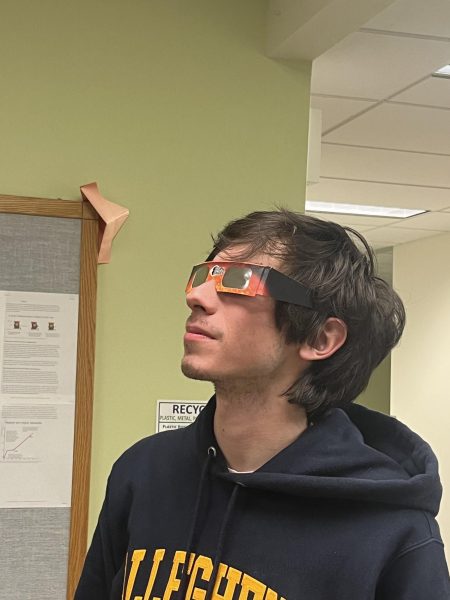‘It takes a village, privilege and individual effort’
Lehman lecture explores ethics of genetic enhancement

Lisa Parker, philosopher and professor at the University of Pittsburgh Graduate School of Public Health, presented her lecture titled, “Genetic Enhancement: A Game Changer for Sports and Social Justice?” on Tuesday, March 26, 2019, in Quigley Auditorium.
In its simplest form, genetic enhancement is the process of selecting genetic material to modify human traits.
Lisa Parker visited Allegheny Tuesday, March 26, to talk about genetic enhancement. Parker’s lecture, titled “Genetic Enhancement: A Game Changer for Sports and Social Justice?” discussed the fairness of genetic enhancement, as it pertains to sports.
Parker is a philosopher and professor of human genetics at the University of Pittsburgh Graduate School of Public Health, and her research is centered around the ethical management of pharmacogenomic research and genetic enhancement.
In addition to her work at the University of Pittsburgh, Parker is an investigator for an international ethics research ethics training program, sponsored by the Fogarty International Center, focused on China. Through the Fogarty International Center, Parker has also facilitated ethics trainings in New Delhi and Kolkata, India.
“Before we get started, I need to acknowledge the donor for this lecture,” said Kirsten Peterson, director of the health professions office.
Parker’s visit to Allegheny was funded through a donation from Jack Lehman, ’54. Lehman funded both Parker’s lecture and a portion of the medical ethics course that is currently being offered.
“Although Jack is no longer with us, he died a couple of years ago, his legacy lives on,” Peterson said.
This year marked the 14th annual Lehman Medical Ethics Lecture at Allegheny.
Previously, the school has welcomed guest lecturers such as Mark R. Wicclair, who presented a lecture titled “Conscientious Objection in Health Care: Deciding When to Accommodate Health Professionals.” Similarly to Parker, Wicclair is a philosopher who teaches at the University of Pittsburgh.
“It is my very great pleasure to introduce Dr. Lisa Parker,” Steven Farrelly-Jackson said. “I met Lisa at a conference last year and told her she would be a wonderful person to come up here.”
Farrelly-Jackson is an associate professor of philosophy at Allegheny, whose research focuses on philosophy of literature, epistemology and global health ethics.
“Her work is further distinguished by her use of feminist approaches to bioethics questions and then the critical analysis of bioethics as a social practice,” Farrelly-Jackson said.
Parker began her lecture by suggesting that students think about biological advantages and impediments in order to think more clearly about social advantages and disadvantages.
“Ultimately, I want to consider the notion of deserved or earned advantages,” Parker said. “I want to focus for a while on performance enhancement in sport, and then later I will turn to broader social context.”
“Our genome is quintessentially natural, given and beyond our control,” Parker said. “We used to think our fate was in the stars, but now we know that in large measure, our fate is in our genes.”
Parker explained genetic testing companies capitalize on genetic research to offer testing on sport performance genetic aptitude.
“Some parents and individuals take advantage of such testing,” Parker said.
Parker said this type of genetic testing is advertised to give parents and coaches early information on their child’s predisposition in sports, including speed and endurance. However, many critics do question the test’s reliability and can cause children to be unfairly pressured and miss opportunities to build character.
During Parker’s lecture, she explained that forms of genetic modification include preimplantation and prenatal detection of relevant genetic material, which allow for the implantation of selected embryos or the termination of pregnancies that do not produce certain genetic material.
“Children born would have an increased likelihood, but no guarantee, of demonstrating superior athletic aptitude,” Parker said.
Advancements in modern science are making genetic modification less risky. According to Parker, genome editing is becoming easier and more practical.
Parker mentioned that newly emerging techniques and procedures for genetic modification have been successful in mice, rats and monkeys.
“Assuming that genetic modification is relatively safe, then to decide whether genetic enhancement is permissible or impermissible, we need to decide whether the intervention is fair,” Parker said.
Parker explained the ethics of genetic enhancement essentially boil down to questions of fairness.
“The whole point of training and strategy and playing the sport is to obtain and demonstrate strategy advantage over competitors,” Parker said.
Parker said the advantage alone is not the problem. Therefore, the problem does not reside in the advantage alone, but instead, how the advantage is obtained and if it is unfairly gained.
An unfairly gained advantage is one that is unearned, unmerited or undeserved, according to Parker.
“This interpretation is problematic in the context of sports,” Parker said. “Think about athletic ability, the born athlete. Did she deserve being a born athlete and her athletic ability?”
Genetics, when they are not modified, form what can be called a “natural lottery.” Some people benefit from this lottery and are born with unearned advantages, while others are not.
“Differing natural ability are a result of the lottery,” Parker said. “Those advantages and disadvantages of nature are beyond the control of the individual.”
Therefore, Parker argued that the problem with genetic modification is not actually that the modification results are unearned. Instead, the problem must be that access to technology to perform genetic enhancement is both unearned and unfairly distributed.
However, problems associated with unearned and unfair distribution also occur outside genetic enhancement, according to Parker.
For example, some children are born into families that prioritize sports and spend great amounts of money on private coaching, while other families either cannot afford those resources or do not care to spend their money on them.
Advantages such as being able to afford a renowned coach are not earned, yet they are not considered to be unfair.
“The concern instead is that enhancements, like steroid use or gene doping, are unfair because they disrupt the fundamental goals of sport and violate its particular conception of fairness,” Parker said. “Neither sport nor just societies seek equality of outcome. Instead, both seek a level playing field.”
The restrictions on athletes are not put in place to ensure that all athletes are equal, but that differences in outcome correlate with differences in ability and motivation, Parker explained.
Sports do not seek equality of outcome. Instead, sports specifically seek inequality of outcome.
“Systems of sport and justice identify inequalities that need to be addressed in order to ensure a level playing field,” Parker said. “They begin with the normative ideal of equality of opportunity and work backwards to determine which inequalities are so substantial that they undermine the notion of a level playing field.”
An argument Parker brought up during her lecture was that the entire concept of sports is to test athletic ability and not the ability of modern technology.
Recent revelations in sport enhancing drugs and genetic enhancement have caused the athlete to no longer be the one responsible for his or her successes.
“(Success) does not result from an age or a developed ability, which is the point of the competition or test, ” Parker said. “Rather, it results from an external factor, the ability of one’s body to efficiently utilize a drug.”
Parker continued, arguing that society must focus on disadvantages over advantages, and a society must decide which social disadvantages should be prevented from undermining equality of opportunity.
“All theories of justice seek to eliminate at least some formal and informal barriers to the exercise of one’s abilities,” Parker said.
Historically, sports do ban items, such as steroids and polyurethane swimsuits, because these items give athletes unfair advantages. However, there are no restrictions on other things, like how much coaching an athlete can receive or the quality of shoes a tennis player can wear.
“We have to decide how we are going to treat future genetic enhancement,” Parker said. “Now we can go on to argue that whether the enterprise of sport can consistently justify its decision with genetic enhancement will depend both on the decision that is made and on what view of individual effort we can ultimately maintain.”
Individual effort, including grit and determination, is often considered to be well within the individual’s control, according to Parker. However, Parker did suggest that many components of individual effort are actually not in the individual’s control and are actually influenced by unjust social practices that are beyond the individual’s control.
“It takes a village,” Parker said. “It takes privilege and a village that works behind the effort.”
The World Anti-Doping Agency, which is an International Olympic Committee initiative, does currently have a ban on genetic modification that restricts anyone with genetic modification from participating in sports.
“The question then becomes, can we tell whether you have been genetically modified as opposed to the product of natural evolution?” Parker said.
Hannah Schaffer is a junior majoring in community and justice studies and minoring in economics and journalism in the public interest. This is Schaffer’s...




